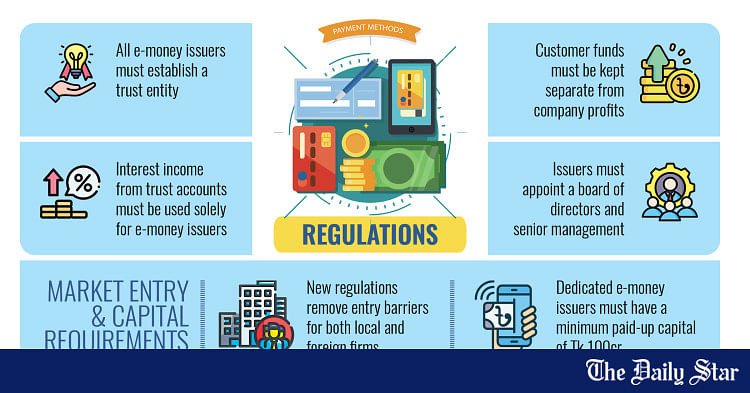Contents
Bangladesh Introduces New E-Money Regulations to Enhance Transparency and Combat Fraud
The Bangladesh banking regulator is set to introduce new regulations, titled ‘Regulation for E-Money Issuers in Bangladesh-2025’, to ensure transparency and discipline in the issuance of e-money and tackle fraud using virtual money. The new rules come in the wake of reports of embezzlement by mobile financial services provider Nagad, which fraudulently issued Tk 645 crore in e-money without maintaining the required currency reserve.
The introduction of these new regulations is a significant step towards enhancing the security and reliability of e-money services in Bangladesh. According to officials familiar with the matter, the new rules will be implemented soon, marking a major overhaul of the existing regulatory framework. The key objective of these regulations is to prevent fraudulent activities, such as the recent Nagad scandal, and promote transparency and accountability in the e-money sector. The regulations will apply to all e-money issuers, including banks, mobile financial services providers, and payment service providers, and will introduce stricter guidelines for the issuance and management of e-money.
Key Provisions of the New Regulations
The new regulations, drafted by a committee of the Payment Systems Department, will require e-money issuers to establish a trust entity under the Trusts Act, 1882. This trust entity will serve as the custodian of trust and settlement accounts, which hold the balances against which e-money is created. Currently, e-money issuers maintain trust and settlement accounts with different banks but do not have a trust entity. The new regulations will ensure that these accounts hold only the money paid for e-money by e-money account holders and will not be blended with the capital, working capital, or operating funds of the issuer.
Some key highlights of the new regulations include:
* E-money issuers must establish a trust entity under the Trusts Act, 1882
* Trust and settlement accounts must hold only the money paid for e-money by e-money account holders
* At least 80% of the interest income earned on the trust settlement account must be spent on the operations of the e-money system
* Barriers to entry into the e-money business have been removed from the previous bank-led or government enterprise model
* Any local or international firm can apply for an e-money issuer licence, subject to compliance with the criteria in the guideline
Removal of Barriers to Entry
One of the significant changes introduced by the new regulations is the removal of barriers to entry into the e-money business. Currently, only banks and government enterprises are able to set up e-money issuers, such as bKash, Nagad, and Rocket. However, under the new regulations, any local or international firm can apply for an e-money issuer licence, subject to compliance with the criteria in the guideline. This is expected to increase competition, expand e-money services to all possible use cases, and reduce costs through the expansion of the ecosystem.
According to a senior official of Bangladesh Bank, “The new regulations will encourage the integration of innovation by fintech firms in the e-money business to pave the way for a cashless Bangladesh. This is expected to increase competition, expand e-money services to all possible use cases, and reduce costs through the expansion of the ecosystem. It will also help tackle fraud.”
Operating Modes for E-Money Issuers
The new regulations will allow e-money issuers to operate in three modes:
* Payment Service Provider (PSP): provides e-wallet services except for cash-in and cash-out services
* Authorised E-Money Issuer: operated as a business unit of a scheduled bank or financial institution, providing full-fledged e-wallet and e-money services, including cash-in and cash-out facilities
* Dedicated E-Money Issuer: separate corporate entities with the ability to provide full-fledged e-wallet and e-money services, including cash-in and cash-out facilities
Each type of entity will have separate capital requirements, and all e-money issuers must be incorporated in Bangladesh. The paid-up capital of a dedicated e-money issuer will be Tk 100 crore to get a central bank licence.
Good Governance and Trust
The new regulations will introduce comprehensive standards regarding technology management, agent management, outsourcing arrangements, etc. The board of directors, senior management, and risk management have been introduced for the first time to promote good governance and trust in the system. The e-money issuers will make it explicit in their memorandum of association that the e-money balances kept in the trust and settlement accounts will be unencumbered.
The regulations will also introduced comprehensive standards regarding technology management, agent management, outsourcing arrangements, etc. All e-money operations, including prepaid cards, travel cards, etc., in domestic or foreign currency, will come under the supervision of these regulations.
Conclusion:
The introduction of the new e-money regulations in Bangladesh is a significant step towards enhancing the security and reliability of e-money services. The regulations will promote transparency and accountability, prevent fraudulent activities, and increase competition in the e-money sector. With the removal of barriers to entry, the e-money business is expected to expand, and the ecosystem is expected to grow, paving the way for a cashless Bangladesh.
Keywords:
* E-money regulations
* Bangladesh banking regulator
* Mobile financial services
* Payment service providers
* Trust entity
* E-money issuers
* Cashless Bangladesh
* Fintech firms
* Good governance
* Trust management
Hashtags:
* #EMoneyRegulations
* #BangladeshBankingRegulator
* #MobileFinancialServices
* #PaymentServiceProviders
* #TrustEntity
* #EMoneyIssuers
* #CashlessBangladesh
* #FintechFirms
* #GoodGovernance
* #TrustManagement
Source link




